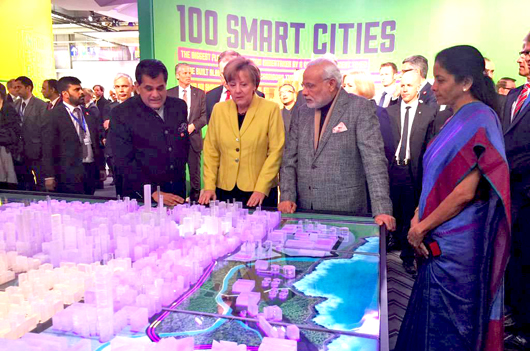Hannover, Apr 13: India has a huge potential to become a global manufacturing hub, Prime Minister Narendra Modi said on Monday as he invited the whole world to partner with the fastest growing economy in this endeavour.

"The entire world is looking at India. Demography, democracy and demand are attracting the world to India," Modi said as he along with German chancellor Angela Merkel inaugurated the 'India Pavilion' at the Hannover Messe, the world's largest industrial fair.
India is the partner country at the fair. "Not only Germany, the whole world is looking at India," Modi said.
"Low-cost manufacturing, efficient governance and no-defect manufacturing makes India a global engine in the manufacturing centre," he said, adding there is a huge potential of India becoming a manufacturing hub.
The Prime Minister invited the whole world to come to India and increase their partnership with the country and make use of the opportunities India offer to scale new heights of success.
"All kinds of rating agencies of the world are saying India is the fastest growing economy," he said.
Merkel said she was impressed with what India is showcasing at the fair.
"India is a country with a lot of young people, people who want jobs, want to see their country developed and evolved," she said.
"We think India has a future when you consider democracy, innovation capacity and prosperity. Your country (India) is a very good example that this is easily possible," the German leader said.
Merkel said Germany is trying to forge a very close partnership with India.
"I think Hannover fair would allow us to turn a new chapter in our relationship. Let me assure you that Germany stands ready to develop this partnership," she said.
After inaugurating the India pavilion, the Prime Minister took a tour of Indian stalls and the rest of the venue.
He also offered tea and snacks to the German Chancellor at the 'India Pavilion'.





Comments
Add new comment